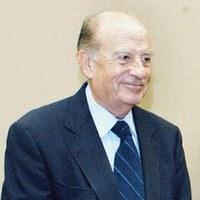Toluca (México), 1922
By José Guadalupe Gandarilla Salgado
Author, co-author, or coordinator of more than sixty books and two hundred articles for journals or chapters in collective works, as well as director of important collections on social sciences, Pablo González Casanova is an essential reference for understanding the current problems of Latin American and global societies. He served twice as president of the Latin American Sociological Association (ALAS) (1968-1972 and 1983-1985).
In his country, he is a member, among other associations, of the Institute of Social Research (IIS) at the National Autonomous University of Mexico (UNAM), where he also served as rector (1970-1972). At UNAM, he left a profound mark in teaching and research: he restructured the professional career model in Social Sciences, created the Open University System and the College of Sciences and Humanities. Simultaneously, he was president of the Latin American Center for Social Research of UNESCO, president of the Steering Committee of the Latin American Faculty of Social Sciences (FLACSO), and project coordinator at the United Nations University. He has taught at the universities of Oxford, Cambridge, and Complutense of Madrid, and at the National School of Political Sciences in Paris. His recognitions include, among others, twelve honorary doctorates and the title of emeritus professor and researcher at UNAM in 1984, the year he received the National Prize for Sciences and Arts in History, Social Sciences, and Philosophy. In 1989, he won the National University Prize in the Social Sciences Research category. In 2003, he received the José Martí International Prize awarded by UNESCO, and in 2004, the José Martí Order granted by the Cuban government. He is a regular member of, among others, the Mexican Academy of Scientific Research, The New York Academy of Sciences, and the American Association for the Advancement of Sciences in Washington, D.C.
Sociological Poles
After completing his master’s degree in Historical Sciences at the College of Mexico, González Casanova earned his Ph.D. in Sociology from the Sorbonne in 1950. His doctoral thesis, French Ideology about Hispanic America, supervised by Fernand Braudel, deals with the different approaches by which Europeans from various periods have viewed America, expressing the changes in their own perspectives, ideologies, and utopias, and how they applied these ideas to American reality.
In 1955, he published The North American Ideology on Foreign Investments, which questions the real possibilities of independence from U.S. imperialism. This was followed by the essay The Gift, Foreign Investments, and Social Theory (1957) and the book Study of Social Technique (1958), which investigates the possibilities and limits of technical knowledge in social change.
In that decade, the nascent development of social sciences in Latin America already foreshadowed the formation of two opposing poles. On one side, those who adhered to “scientific sociology,” rooted in metropolitan centers, characterized by “value-neutral” judgments, use of quantitative techniques and instruments, and empirical methods. On the other, a set of works aligned with what González Casanova termed in 1968 “the new sociology.” After the Cuban revolution and during the 1960s, modernization theory, then in crisis, began to be questioned from two different perspectives: the discourse of development and dependency theories. A testament to González Casanova’s conceptual rigor is that themes present in three of his books from this period continue to dominate his current concerns.
Democracy, Development, and Exploitation
In 1965, he published Democracy in Mexico, a highly influential book academically and politically, which approached power as an integral social process. The historiographic style gave way to the use of different levels of analysis to relate the formal structure of power to the real structure, its national dimension to the international. His analysis focused on social structure and its intrinsic social relations, shaped by internal colonialism.
The success of this book somewhat overshadowed two fundamental works published shortly afterward. In The Categories of Economic Development and Social Science Research (1967), he emphasized the qualitative problems underlying quantitative research and how measuring phenomena requires knowing what is being measured. Sociology of Exploitation (1969), in turn, distances itself from both critical positions—which fear the risk of eclecticism if they seek mathematical modeling of social or natural phenomena—and empirical sociology—which denies the possibility of including “the determined social relation of exploitation” as an explanatory category for a broad set of social phenomena. The exploitation of classes and both international and internal regions was articulated in the following decade with a meticulous historical analysis of Latin America’s domination by imperialism and the peoples’ liberation struggles toward socialism, the central theme of Imperialism and Liberation (1978).
In his more recent works, González Casanova incorporates advances from new sciences, complexity studies, and systems theories. In The New Sciences and the Humanities: From Academia to Politics (2004), he addresses, from various fronts, the complex problem of the articulation between (new) sciences and humanities. He argues about the possibility of change in today’s world, although he does not ignore that this also intervenes in the dialectics of hegemonic knowledge and its possible critique as an overcoming through alternative knowledges and powers, via a think-do approach that, in his theory and practice, repositions the problems of democracy, liberation, and socialism.
A tireless traveler, he participates in events, demonstrations, and assemblies worldwide. In 2011, he gave a long interview to historian Claudio Albertani, commenting on the crises and popular movements erupting at the time.



